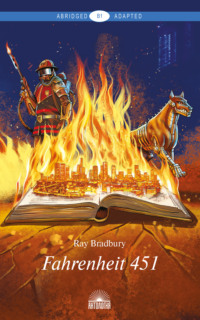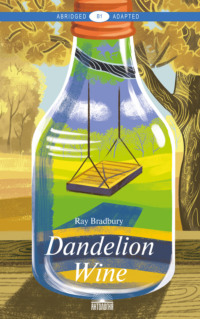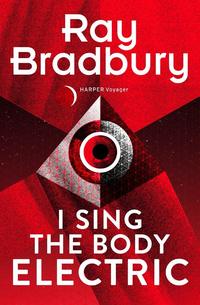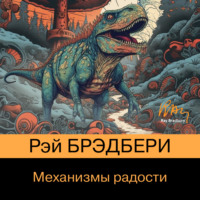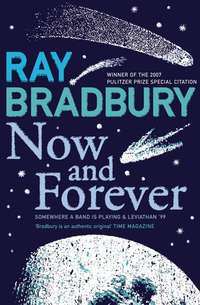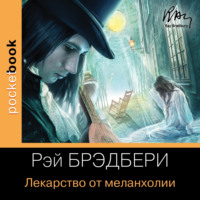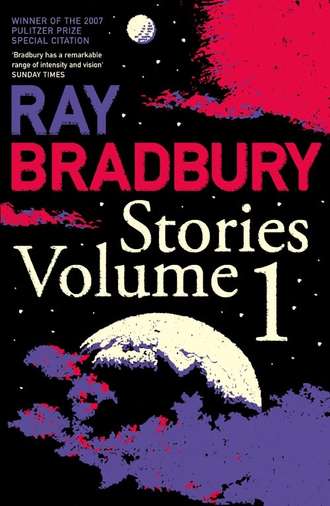
Полная версия
Ray Bradbury Stories Volume 1
‘You’ve got it wrong.’
‘Let me have it then.’ Hitchcock sat, finished with his meal, looking out the port. The other men glanced at him.
‘Do meteors exist?’ asked Hitchcock.
‘You know damn well they do.’
‘In our radar machines – yes, as streaks of light in space. No, I don’t believe in anything that doesn’t exist and act in my presence. Sometimes’ – he nodded at the men finishing their food – ‘sometimes I don’t believe in anyone or anything but me.’ He sat up. ‘Is there an upstairs to this ship?’
‘Yes.’
‘I’ve got to see it immediately.’
‘Don’t get excited.’
‘You wait here; I’ll be right back.’ Hitchcock walked out swiftly. The other men sat nibbling their food slowly. A moment passed. One of the men raised his head. ‘How long’s this been going on? I mean Hitchcock.’
‘Just today.’
‘He acted funny the other day too.’
‘Yes, but it’s worse today.’
‘Has anyone told the psychiatrist?’
‘We thought he’d come out of it. Everyone has a little touch of space the first time out. I’ve had it. You get wildly philosophical, then frightened. You break into a sweat, then you doubt your parentage, you don’t believe in Earth, you get drunk, wake up with a hangover, and that’s it.’
‘But Hitchcock don’t get drunk,’ said someone. ‘I wish he would.’
‘How’d he ever get past the examining board?’
‘How’d we all get past? They need men. Space scares the hell out of most people. So the board lets a lot of borderlines through.’
‘That man isn’t a borderline,’ said someone. ‘He’s a fall-off-a-cliff-and-no-bottom-to-hit.’
They waited for five minutes. Hitchcock didn’t come back.
Clemens finally got up and went out and climbed the circular stair to the flight deck above. Hitchcock was there, touching the wall tenderly.
‘It’s here,’ he said.
‘Of course it is.’
‘I was afraid it might not be.’ Hitchcock peered at Clemens. ‘And you’re alive.’
‘I have been for a long time.’
‘No,’ said Hitchcock. ‘Now, just now, this instant, while you’re here with me, you’re alive. A moment ago you weren’t anything.’
‘I was to me,’ said the other.
‘That’s not important. You weren’t here with me,’ said Hitchcock. ‘Only that’s important. Is the crew down below?’
‘Yes.’
‘Can you prove it?’
‘Look, Hitchcock, you’d better see Dr Edwards. I think you need a little servicing.’
‘No. I’m all right. Who’s the doctor, anyway? Can you prove he’s on this ship?’
‘I can. All I have to do is call him.’
‘No. I mean, standing here, in this instant, you can’t prove he’s here, can you?’
‘Not without moving, I can’t.’
‘You see. You have no mental evidence. That’s what I want, a mental evidence I can feel. I don’t want physical evidence, proof you have to go out and drag in. I want evidence that you can carry in your mind and always touch and smell and feel. But there’s no way to do that. In order to believe in a thing you’ve got to carry it with you. You can’t carry the Earth, or a man, in your pocket. I want a way to do that, carry things with me always, so I can believe in them. How clumsy to have to go to all the trouble of going out and bringing in something terribly physical to prove something. I hate physical things because they can be left behind and it becomes impossible to believe in them.’
‘Those are the rules of the game.’
‘I want to change them. Wouldn’t it be fine if we could prove things with our mind, and know for certain that things are always in their place? I’d like to know what a place is like when I’m not there. I’d like to be sure.’
‘That’s not possible.’
‘You know,’ said Hitchcock, ‘I first got the idea of coming out into space about five years ago. About the time I lost my job. Did you know I wanted to be a writer? Oh yes, one of those men who always talk about writing but rarely write. And too much temper. So I lost my good job and left the editorial business and couldn’t get another job and went on downhill. Then my wife died. You see, nothing stays where you put it – you can’t trust material things. I had to put my boy in an aunt’s trust, and things got worse; then one day I had a story published with my name on it, but it wasn’t me.’
‘I don’t get you.’
Hitchcock’s face was pale and sweating.
‘I can only say that I looked at the page with my name under the title. By Joseph Hitchcock. But it was some other man. There was no way to prove – actually prove, really prove – that that man was me. The story was familiar – I knew I had written it – but that name on the paper still was not me. It was a symbol, a name. It was alien. And then I realized that even if I did become successful at writing, it would never mean a thing to me, because I couldn’t identify myself with that name. It would be soot and ashes. So I didn’t write any more. I was never sure, anyway, that the stories I had in my desk a few days later were mine, though I remembered typing them. There was always that gap of proof. That gap between doing and having done. What is done is dead and is not proof, for it is not an action. Only actions are important. And pieces of paper were remains of actions done and over and now unseen. The proof of doing was over and done. Nothing but memory remained, and I didn’t trust my memory. Could I actually prove I’d written these stories? No. Can any author? I mean proof. I mean action as proof. No. Not really. Not unless someone sits in the room while you type, and then maybe you’re doing it from memory. And once a thing is accomplished there is no proof, only memory. So then I began to find gaps between everything. I doubted I was married or had a child or ever had a job in my life. I doubted that I had been born in Illinois and had a drunken father and swinish mother. I couldn’t prove anything. Oh yes, people could say, ‘You are thus-and-so and such-and-such,’ but that was nothing.’
‘You should get your mind off stuff like that,’ said Clemens.
‘I can’t. All the gaps and spaces. And that’s how I got to thinking about the stars. I thought how I’d like to be in a rocket ship in space, in nothing, in nothing, going on into nothing with just a thin something, a thin eggshell of metal holding me, going on away from all the somethings with gaps in them that couldn’t prove themselves. I knew then that the only happiness for me was space. When I get to Aldebaran ll I’ll sign up to return on the five-year journey to Earth and so go back and forth like a shuttlecock all the rest of my life.’
‘Have you talked about this to the psychiatrist?’
‘So he could try to mortar up the gaps for me, fill in the gulfs with noise and warm water and words and hands touching me, and all that? No, thanks.’ Hitchcock stopped. ‘I’m getting worse, aren’t I? I thought so. This morning when I woke up I thought. I’m getting worse. Or is it better?’ He paused again and cocked an eye at Clemens. ‘Are you there? Are you really there? Go on, prove it.’
Clemens slapped him on the arm, hard.
‘Yes,’ said Hitchcock, rubbing his arm, looking at it very thoroughly, wonderingly, massaging it. ‘You were there. For a brief fraction of an instant. But I wonder if you are – now.’
‘See you later,’ said Clemens. He was on his way to find the doctor. He walked away.
A bell rang. Two bells, three bells rang. The ship rocked as if a hand had slapped it. There was a sucking sound, the sound of a vacuum cleaner turned on. Clemens heard the screams and felt the air thin. The air hissed away about his ears. Suddenly there was nothing in his nose or lungs. He stumbled and then the hissing stopped.
He heard someone cry, ‘A meteor!’ Another said. ‘It’s patched!’ And this was true. The ship’s emergency spider, running over the outside of the hull, had slapped a hot patch on the hole in the metal and welded it tight.
Someone was talking and talking and then beginning to shout at a distance. Clemens ran along the corridor through the freshening, thickening air. As he turned in at a bulkhead he saw the hole in the steel wall, freshly sealed; he saw the meteor fragments lying about the room like bits of a toy. He saw the captain and the members of the crew and a man lying on the floor. It was Hitchcock. His eyes were closed and he was crying. ‘It tried to kill me,’ he said, over and over. ‘It tried to kill me.’ They got him on his feet. ‘It can’t do that,’ said Hitchcock. ‘That’s not how it should be. Things like that can’t happen, can they? It came in after me. Why did it do that?’
‘All right, all right, Hitchcock,’ said the captain.
The doctor was bandaging a small cut on Hitchcock’s arm. Hitchcock looked up, his face pale, and saw Clemens there looking at him. ‘It tried to kill me,’ he said.
‘I know,’ said Clemens.
Seventeen hours passed. The ship moved on in space.
Clemens stepped through a bulkhead and waited. The psychiatrist and the captain were there. Hitchcock sat on the floor with his legs drawn up to his chest, arms wrapped tight about them.
‘Hitchcock,’ said the captain.
No answer.
‘Hitchcock, listen to me,’ said the psychiatrist.
They turned to Clemens. ‘You’re his friend?’
‘Yes.’
‘Do you want to help us?’
‘If I can.’
‘It was that damned meteor,’ said the captain. ‘This might not have happened if it hadn’t been for that.’
‘It would’ve come anyway, sooner or later,’ said the doctor. To Clemens: ‘You might talk to him.’
Clemens walked quietly over and crouched by Hitchcock and began to shake his arm gently, calling in a low voice, ‘Hey there, Hitchcock.’
No reply.
‘Hey, it’s me. Me, Clemens,’ said Clemens. ‘Look, I’m here.’ He gave the arm a little slap. He massaged the rigid neck, gently, and the back of the bent-down head. He glanced at the psychiatrist, who sighed very softly. The captain shrugged.
‘Shock treatment, Doctor?’
The psychiatrist nodded. ‘We’ll start within the hour.’
Yes, thought Clemens, shock treatment. Play a dozen jazz records for him, wave a bottle of fresh green chlorophyll and dandelions under his nose, put grass under his feet, squirt Chanel on the air, cut his hair, clip his fingernails, bring him a woman, shout, bang and crash at him, fry him with electricity, fill the gap and the gulf, but where’s your proof? You can’t keep proving to him forever. You can’t entertain a baby with rattles and sirens all night every night for the next thirty years. Sometime you’ve got to stop. When you do that, he’s lost again. That is, if he pays any attention to you at all.
‘Hitchcock!’ he cried, as loud as he could, almost frantically, as if he himself were falling over a cliff. ‘It’s me. It’s your pal! Hey!’
Clemens turned and walked away out of the silent room.
Twelve hours later another alarm bell rang.
After all of the running had died down, the captain explained: ‘Hitchcock snapped out of it for a minute or so. He was alone. He climbed into a space suit. He opened an airlock. Then he walked out into space – alone.’
Clemens blinked through the immense glass port, where there was a blur of stars and distant blackness. ‘He’s out there now?’
‘Yes. A million miles behind us. We’d never find him. First time I knew he was outside the ship was when his helmet radio came in on our control-room beam. I heard him talking to himself.’
‘What did he say?’
‘Something like “No more space ship now. Never was any. No people. No people in all the universe. Never were any. No plants. No stars.” That’s what he said. And then he said something about his hands and feet and legs. “No hands,” he said. “I haven’t any hands any more. Never had any. No feet. Never had any. Can’t prove it. No body. Never had any. No lips. No face. No head. Nothing. Only space. Only space. Only the gap.’
The men turned quietly to look from the glass port out into the remote and cold stars.
Space, thought Clemens. The space that Hitchcock loved so well. Space, with nothing on top, nothing on the bottom, a lot of empty nothings between, and Hitchcock falling in the middle of the nothing, on his way to no particular night and no particular morning …
The City
The city waited twenty thousand years.
The planet moved through space and the flowers of the fields grew up and fell away, and still the city waited; and the rivers of the planet rose and waned and turned to dust. Still the city waited. The winds that had been young and wild grew old and serene, and the clouds of the sky that had been ripped and torn were left alone to drift in idle whitenesses. Still the city waited.
The city waited with its windows and its black obsidian walls and its sky towers and its unpennanted turrets, with its untrod streets and its untouched doorknobs, with not a scrap of paper or a fingerprint upon it. The city waited while the planet arced in space, following its orbit about a blue-white sun, and the seasons passed from ice to fire and back to ice and then to green fields and yellow summer meadows.
It was on a summer afternoon in the middle of the twenty thousandth year that the city ceased waiting.
In the sky a rocket appeared.
The rocket soared over, turned, came back, and landed in the shale meadow fifty yards from the obsidian wall.
There were booted footsteps in the thin grass and calling voices from men within the rocket to men without.
‘Ready?’
‘All right, men. Careful! Into the city. Jensen, you and Hutchinson patrol ahead. Keep a sharp eye.’
The city opened secret nostrils in its black walls and a steady suction vent deep in the body of the city drew storms of air back through channels, through thistle filters and dust collectors, to a fine and tremblingly delicate series of coils and webs which glowed with silver light. Again and again the immense suctions occurred; again and again the odors from the meadow were borne upon warm winds into the city.
‘Fire odor, the scent of a fallen meteor, hot metal. A ship has come from another world. The brass smell, the dusty fire smell of burned powder, sulphur, and rocket brimstone.’
This information, stamped on tapes which sprocketed into slots, slid down through yellow cogs into further machines.
Click-chakk-chakk-chakk.
A calculator made the sound of a metronome. Five, six, seven, eight, nine. Nine men! An instantaneous typewriter inked this message on tape which slithered and vanished.
Clickety-click-chakk-chakk.
The city awaited the soft tread of their rubberoid boots.
The great city nostrils dilated again.
The smell of butter. In the city air, from the stalking men, faintly, the aura which wafted to the great Nose broke down into memories of milk, cheese, ice cream, butter, the effluvia of a dairy economy.
Click-click.
‘Careful, men!’
‘Jones, get your gun out. Don’t be a fool!’
‘The city’s dead; why worry?’
‘You can’t tell.’
Now, at the barking talk, the Ears awoke. After centuries of listening to winds that blew small and faint, of hearing leaves strip from trees and grass grow softly in the time of melting snows, now the Ears oiled themselves in a self-lubrication, drew taut, great drums upon which the heartbeat of the invaders might pummel and thud delicately as the tremor of a gnat’s wing. The Ears listened and the Nose siphoned up great chambers of odor.
The perspiration of frightened men arose. There were islands of sweat under their arms, and sweat in their hands as they held their guns.
The Nose sifted and worried this air, like a connoisseur busy with an ancient vintage.
Chikk-chikk-chakk-click.
Information rotated down on parallel check tapes. Perspiration; chlorides such-and-such percent; sulphates so-and-so; urea nitrogen, ammonia nitrogen, thus: creatinine, sugar, lactic acid, there!
Bells rang. Small totals jumped up.
The Nose whispered, expelling the tested air. The great Ears listened:
‘I think we should go back to the rocket, Captain.’
‘I give the orders, Mr Smith!’
‘Yes, sir.’
‘You, up there! Patrol! See anything?’
‘Nothing, sir. Looks like it’s been dead a long time!’
‘You see, Smith? Nothing to fear.’
‘I don’t like it. I don’t know why. You ever feel you’ve seen a place before? Well, this city’s too familiar.’
‘Nonsense. This planetary system’s billions of miles from Earth; we couldn’t possibly’ve been here ever before. Ours is the only light-year rocket in existence.’
‘That’s how I feel, anyway, sir. I think we should get out.’
The footsteps faltered. There was only the sound of the intruder’s breath on the still air.
The Ear heard and quickened. Rotors glided, liquids glittered in small creeks through valves and blowers. A formula and a concoction – one followed another. Moments later, responding to the summons of the Ear and Nose, through giant holes in the city walls a fresh vapor blew out over the invaders.
‘Smell that, Smith? Ahh. Green grass. Ever smell anything better? By God, I just like to stand here and smell it.’
Invisible chlorophyll blew among the standing men.
‘Ahh!’
The footsteps continued.
‘Nothing wrong with that, eh, Smith? Come on!’
The Ear and Nose relaxed a billionth of a fraction. The countermove had succeeded. The pawns were proceeding forward.
Now the cloudy Eyes of the city moved out of fog and mist.
‘Captain, the windows!’
‘What?’
‘Those house windows, there! I saw them move!’
‘I didn’t see it.’
‘They shifted. They changed color. From dark to light.’
‘Look like ordinary square windows to me.’
Blurred objects focused. In the mechanical ravines of the city oiled shafts plunged, balance wheels dipped over into green oil pools. The window frames flexed. The windows gleamed.
Below, in the street, walked two men, a patrol, followed, at a safe interval, by seven more. Their uniforms were white, their faces as pink as if they had been slapped: their eyes were blue. They walked upright, upon hind legs, carrying metal weapons. Their feet were booted. They were males, with eyes, ears, mouths, noses.
The windows trembled. The windows thinned. They dilated imperceptibly, like the irises of numberless eyes.
‘I tell you. Captain, it’s the windows!’
‘Get along.’
‘I’m going back, sir.’
‘What?’
‘I’m going back to the rocket.’
‘Mr Smith!’
‘I’m not falling into any trap!’
‘Afraid of an empty city?’
The others laughed, uneasily.
‘Go on, laugh!’
The street was stone-cobbled, each stone three inches wide, six inches long. With a move unrecognizable as such, the street settled. It weighed the invaders.
In a machine cellar a red wand touched a numeral: 178 pounds … 210, 154, 201, 198 – each man weighed, registered and the record spooled down into a correlative darkness.
Now the city was fully awake!
Now the vents sucked and blew air, the tobacco odor from the invaders’ mouths, the green soap scent from their hands. Even their eyeballs had a delicate odor. The city detected it, and this information formed totals which scurried down to total other totals. The crystal windows glittered, the Ear tautened and skinned the drum of its hearing tight, tighter – all of the senses of the city swarming like a fall of unseen snow, counting the respiration and the dim hidden heartbeats of the men, listening, watching, tasting.
For the streets were like tongues, and where the men passed, the taste of their heels ebbed down through stone pores to be calculated on litmus. This chemical totality, so subtly collected, was appended to the now increasing sums waiting the final calculation among the whirling wheels and whispering spokes.
Footsteps. Running.
‘Come back! Smith!’
‘No, blast you!’
‘Get him, men!’
Footsteps rushing.
A final test. The city, having listened, watched, tasted, felt, weighed, and balanced, must perform a final task.
A trap flung wide in the street. The captain, unseen by the others, running, vanished.
Hung by his feet, a razor drawn across his throat, another down his chest, his carcass instantly emptied of its entrails, exposed upon a table under the street, in a hidden cell, the captain died. Great crystal microscopes stared at the red twines of muscle; bodiless fingers probed the still-pulsing heart. The flaps of his sliced skin were pinned to the table while hands shifted parts of his body like a quick and curious player of chess, using the red pawns and the red pieces.
Above on the street the men ran. Smith ran, men shouted. Smith shouted, and below in this curious room blood flowed into capsules, was shaken, spun, shoved on smear slides under further microscopes, counts made, temperatures taken, heart cut in seventeen sections, liver and kidneys expertly halved. Brain was drilled and scooped from bone socket, nerves pulled forth like the dead wires of a switchboard, muscles plucked for elasticity, while in the electric subterrene of the city the Mind at last totaled out its grandest total and all of the machinery ground to a monstrous and momentary halt.
The total.
These are men. These are men from a far world, a certain planet, and they have certain eyes, certain ears, and they walk upon legs in a specified way and carry weapons and think and fight, and they have particular hearts and all such organs as are recorded from long ago.
Above, men ran down the street toward the rocket.
Smith ran.
The total.
These are our enemies. These are the ones we have waited for twenty thousand years to see again. These are the men upon whom we waited to visit revenge. Everything totals. These are the men of a planet called Earth, who declared war upon Taollan twenty thousand years ago, who kept us in slavery and ruined us and destroyed us with a great disease. Then they went off to live in another galaxy to escape that disease which they visited upon us after ransacking our world. They have forgotten that war and that time, and they have forgotten us. But we have not forgotten them. These are our enemies. This is certain. Our waiting is done.
‘Smith, come back!’
Quickly. Upon the red table, with the spread-eagled captain’s body empty, new hands began a flight of motion. Into the wet interior were placed organs of copper, brass, silver, aluminum, rubber and silk; spiders spun gold web which was stung into the skin: a heart was attached, and into the skull case was fitted a platinum brain which hummed and fluttered small sparkles of blue fire, and the wires led down through the body to the arms and legs. In a moment the body was sewn tight, the incisions waxed, healed at neck and throat and about the skull – perfect, fresh, new.
The captain sat up and flexed his arms.
‘Stop!’
On the street the captain reappeared, raised his gun and fired.
Smith fell, a bullet in his heart.
The other men turned.
The captain ran to them.
‘That fool! Afraid of a city!’
They looked at the body of Smith at their feet.
They looked at their captain, and their eyes widened and narrowed.
‘Listen to me,’ said the captain. ‘I have something important to tell you.’
Now the city, which had weighed and tasted and smelled them, which had used all its powers save one, prepared to use its final ability, the power of speech. It did not speak with the rage and hostility of its massed walls or towers, nor with the bulk of its cobbled avenues and fortresses of machinery. It spoke with the quiet voice of one man.



